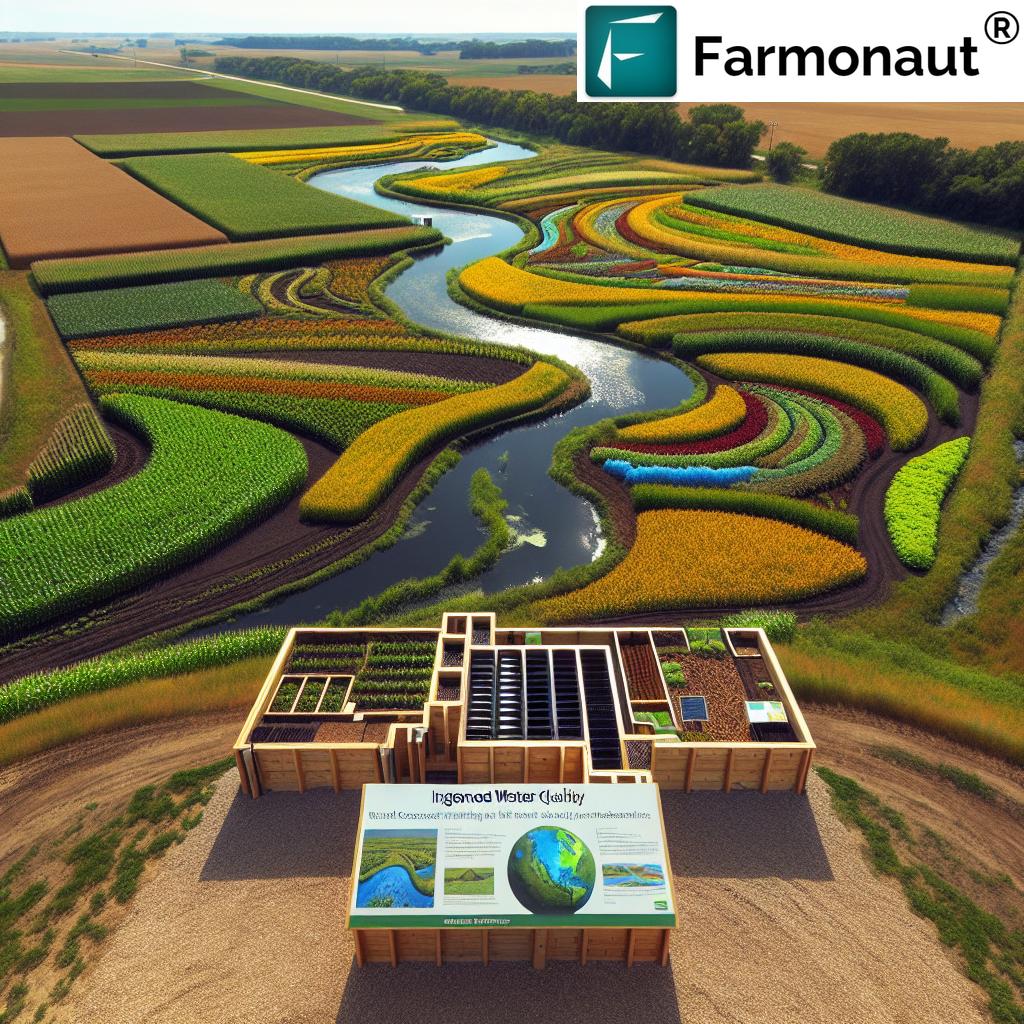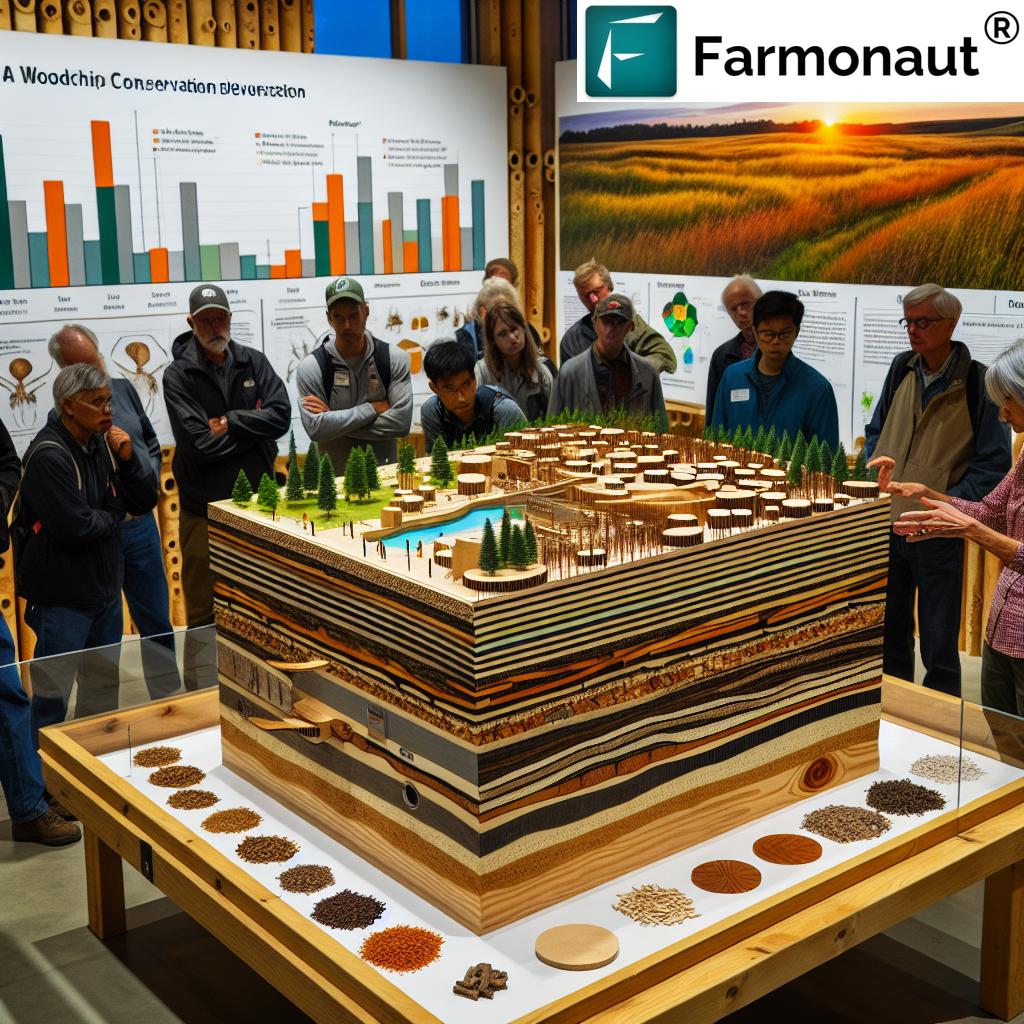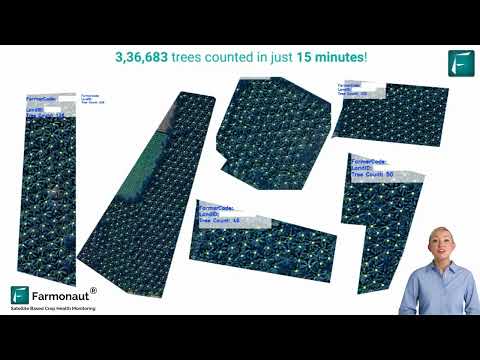Iowa’s Woodland Management Workshop: Boosting Water Quality with Innovative Bioreactors
“Woodchip bioreactors can reduce nitrate levels by up to 43% in agricultural runoff, improving water quality significantly.”
We’re excited to share with you an incredible opportunity for Iowa’s farmers and landowners to enhance their woodland management skills while contributing to improved water quality across our beautiful state. The Iowa Learning Farms, in collaboration with Iowa State University, is hosting a groundbreaking workshop that brings together the worlds of forestry and water conservation. This event promises to be a game-changer for those interested in sustainable agriculture practices and innovative Iowa conservation techniques.
The Synergy of Woodland Management and Water Quality
At the heart of this workshop is the exploration of how woodland management can directly impact water quality. As we delve into the intricacies of this relationship, we’ll discover how traditional forestry practices can be adapted to serve a dual purpose: maintaining healthy woodlands and improving the quality of our precious water resources.

The workshop will take place on February 18, from 12 p.m. to 2 p.m. at the Briggs Woods Conference Center near Webster City. This free event includes a complimentary meal, making it accessible to all interested farmers and landowners. However, space is limited, so we encourage you to reserve your spot as soon as possible.
Cutting-Edge Research on Woodchip Bioreactors
One of the most exciting aspects of this woodland management workshop is the focus on woodchip bioreactors for nitrate reduction. This innovative technology represents a significant leap forward in our efforts to improve water quality while making use of traditionally low-value timber species.
Led by experts Billy Beck, an ISU Extension and Outreach forestry specialist, and Michelle Soupir, a professor of agricultural and biosystems engineering at Iowa State, attendees will gain insights into:
- The science behind woodchip bioreactors
- How these bioreactors effectively reduce nitrate levels in water systems
- The potential of using low-value timber species in bioreactor construction
- Strategies for integrating bioreactors into existing woodland management plans
This research project, funded by the USDA National Institute of Food and Agriculture, demonstrates Iowa’s commitment to finding innovative solutions that balance agricultural productivity with environmental stewardship.
Soil Health and Water Conservation: A Holistic Approach
Understanding the intricate relationship between soil health and water conservation is crucial for sustainable agriculture in Iowa. Our workshop will delve into how proper woodland management contributes to both aspects:
- Improved soil structure and organic matter content
- Enhanced water retention capabilities
- Reduced soil erosion and nutrient runoff
- Increased biodiversity in woodland ecosystems
By adopting a holistic approach to land management, we can create a more resilient and sustainable agricultural system that benefits both farmers and the environment.
“Iowa’s woodland management workshop aims to utilize 15-20% of low-value timber species for water quality improvement projects.”
Integrating Innovative Farming Practices
Our workshop isn’t just about woodland management; it’s about revolutionizing the way we approach farming in Iowa. We’ll explore how innovative farming practices can complement woodland management strategies to create a more sustainable and profitable agricultural system.

Some of the innovative farming practices we’ll discuss include:
- Precision agriculture techniques
- Cover cropping strategies
- Integrated pest management
- Agroforestry systems
These practices, when combined with effective woodland management, can significantly improve water quality while maintaining or even increasing farm profitability.
The Role of Technology in Modern Agriculture
In today’s rapidly evolving agricultural landscape, technology plays a crucial role in helping farmers make informed decisions. While our workshop focuses on traditional woodland management techniques, we also recognize the importance of integrating modern technologies for optimal results.
One such technology that’s revolutionizing the way we approach farm management is satellite-based monitoring. Farmonaut, a pioneering agricultural technology company, offers advanced, satellite-based farm management solutions that can complement the strategies discussed in our workshop.
Farmonaut’s platform provides valuable services such as:
- Real-time crop health monitoring
- AI-based advisory systems
- Resource management tools
These tools can help farmers implement and monitor the effectiveness of the woodland management and water quality improvement strategies we’ll discuss in the workshop.
Comparative Analysis of Woodland Management Techniques
To help you understand the various approaches to woodland management for water quality improvement, we’ve prepared a comparative analysis of different techniques:
| Management Technique | Nitrate Reduction Potential (%) | Implementation Cost | Maintenance Requirements | Additional Environmental Benefits |
|---|---|---|---|---|
| Woodchip Bioreactors | 30-43 | Medium | Low | Carbon sequestration, habitat creation |
| Riparian Buffers | 40-65 | Medium | Medium | Erosion control, wildlife habitat |
| Cover Crops | 20-35 | Low | Medium | Soil health improvement, erosion prevention |
| Precision Nutrient Management | 15-25 | High | High | Reduced fertilizer use, improved crop yields |
| Agroforestry Systems | 25-50 | High | Medium | Biodiversity enhancement, carbon sequestration |
This table provides a clear overview of the various techniques we’ll discuss during the workshop, helping you make informed decisions about which strategies might work best for your land.
The Impact of Woodland Management on Iowa’s Water Quality Goals
Iowa has set ambitious statewide water quality goals, and proper woodland management plays a crucial role in achieving these objectives. By implementing the strategies we’ll discuss in the workshop, landowners can significantly contribute to:
- Reducing nitrate levels in Iowa’s waterways
- Improving overall water quality in rivers and streams
- Enhancing aquatic habitats for native species
- Mitigating the effects of agricultural runoff
Our workshop will provide you with the knowledge and tools to become an active participant in these important conservation efforts.
The Economic Benefits of Sustainable Woodland Management
While the environmental benefits of proper woodland management are clear, it’s equally important to consider the economic advantages. Our workshop will explore how sustainable practices can lead to:
- Increased timber value through selective harvesting
- Potential income from ecosystem services
- Reduced input costs for agricultural operations
- Improved land value and productivity
By adopting these practices, Iowa’s farmers and landowners can ensure both the ecological and economic sustainability of their operations.
Collaborative Efforts for a Sustainable Future
The success of Iowa’s water quality initiatives depends on the collective efforts of farmers, landowners, researchers, and policymakers. Our workshop aims to foster collaboration and knowledge-sharing among these groups, creating a network of informed and engaged individuals working towards a common goal.
We’re proud to have the support of various organizations in this endeavor, including:
- Iowa Department of Agriculture and Land Stewardship
- Iowa State University Extension and Outreach
- USDA Natural Resources Conservation Service
- USDA National Institute of Food and Agriculture
Together, we can create a more sustainable and prosperous future for Iowa’s agriculture and natural resources.
Leveraging Technology for Precision Agriculture
While our workshop focuses on woodland management, it’s important to recognize the role of technology in modern agriculture. Precision agriculture tools can complement the strategies we’ll discuss, helping farmers implement and monitor conservation practices more effectively.
For those interested in exploring satellite-based farm management solutions, Farmonaut offers a range of tools that can support your conservation efforts:
- Satellite & Weather API for developers looking to integrate precise agricultural data into their applications
- Mobile apps for both
 and
and  platforms, allowing for on-the-go monitoring of crop health and environmental conditions
platforms, allowing for on-the-go monitoring of crop health and environmental conditions - A comprehensive
 for detailed analysis and management of your agricultural operations
for detailed analysis and management of your agricultural operations
These tools can help you implement the woodland management and water quality improvement strategies we’ll discuss in the workshop with greater precision and efficiency.
Join Us in Shaping Iowa’s Agricultural Future
We invite all Iowa farmers and landowners to join us for this invaluable woodland management workshop. By participating, you’ll gain:
- Cutting-edge knowledge on woodland management for water quality improvement
- Insights into innovative agricultural practices that balance productivity and conservation
- Networking opportunities with experts and fellow landowners
- A chance to contribute to Iowa’s sustainable agricultural future
Don’t miss this opportunity to be at the forefront of sustainable agriculture in Iowa. Reserve your spot today and take the first step towards improved land stewardship and water quality management.
Frequently Asked Questions
Q: Who can attend the woodland management workshop?
A: The workshop is open to all Iowa farmers and landowners interested in learning about sustainable agriculture practices and water quality improvement through woodland management.
Q: Is there a cost to attend the workshop?
A: No, the workshop is free to attend and includes a complimentary meal. However, registration is required due to limited space.
Q: How can I register for the workshop?
A: To register, please contact Liz Ripley at 515-294-5429 or email [email protected]. Be sure to mention any accommodation requests you may have.
Q: What topics will be covered in the workshop?
A: The workshop will cover woodland management techniques, woodchip bioreactors for nitrate reduction, soil health and water conservation strategies, and innovative farming practices that complement these efforts.
Q: How long is the workshop?
A: The workshop runs from 12 p.m. to 2 p.m. on February 18.
Q: Where is the Briggs Woods Conference Center located?
A: The Briggs Woods Conference Center is located at 2501 Briggs Woods Trail, Webster City, Iowa.
Q: Will there be opportunities for hands-on learning?
A: While the specific format hasn’t been detailed, the workshop aims to provide practical insights that can be applied to your land management practices.
Q: Can I learn more about precision agriculture tools at the workshop?
A: While the workshop focuses on woodland management, you can explore complementary precision agriculture tools like those offered by Farmonaut to enhance your farm management strategies.
Conclusion: Embracing Sustainable Agriculture for a Brighter Future
As we conclude, we want to emphasize the importance of this woodland management workshop in shaping the future of Iowa’s agriculture. By integrating sustainable practices, innovative technologies, and a commitment to water quality improvement, we can create a more resilient and prosperous agricultural sector.
We encourage all Iowa farmers and landowners to take advantage of this unique opportunity. Together, we can lead the way in sustainable agriculture, ensuring that our state’s natural resources are preserved for generations to come.
Remember, the future of Iowa’s agriculture is in our hands. Let’s work together to make it sustainable, productive, and environmentally responsible.
Earn With Farmonaut: Affiliate Program
Earn 20% recurring commission with Farmonaut’s affiliate program by sharing your promo code and helping farmers save 10%. Onboard 10 Elite farmers monthly to earn a minimum of $148,000 annually—start now and grow your income!




